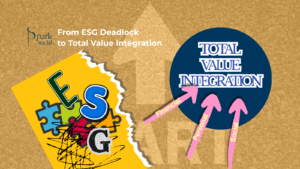
The Future of Social Value: Trends for the Next Decade
As the global economy evolves and societal challenges become more interconnected, social value has emerged as a cornerstone of sustainable business strategies. For organizations, embedding social value into core operations is no longer a “nice-to-have”—it is a critical factor for resilience, innovation, and long-term growth. Over the next decade, the concept of social value will continue to evolve, presenting both challenges and opportunities. Below, we explore key trends that are shaping the future of social value and their implications for businesses.
Impact-Driven Investment Takes Center Stage
Investors are increasingly prioritizing Environmental, Social, and Governance (ESG) factors and demanding transparency on social impact metrics. Financial institutions and private equity firms are leading the charge, integrating impact-driven investment models that align portfolios with the Sustainable Development Goals (SDGs). Over the next decade, we will see businesses adopting innovative financing mechanisms, such as sustainability-linked bonds and impact funds, to ensure capital is channeled toward meaningful societal outcomes.
From Compliance to Purpose-Driven StrategiesFrom Compliance to Purpose-Driven Strategies
Traditional compliance will transform into purpose-driven governance as companies recognize that social value is not merely about following regulations—it’s about leading with intent. Organizations are expected to reframe their operational goals to focus on stakeholder engagement, ethical governance, and contributing to systemic change. Businesses that authentically connect their purpose with their social value initiatives will build stronger trust with consumers, investors, and employees.
Technology as an Enabler of Social Value
The next decade will witness rapid advancements in technology that enable businesses to scale their social impact. Blockchain will drive greater transparency in ethical supply chains, artificial intelligence will enhance impact measurement, and digital platforms will democratize access to resources for underserved communities. Companies that leverage technology to address social inequities will set themselves apart as innovators in the social value ecosystem.
Measurable Impact Will Dominate the Narrative
A significant shift is happening in how businesses measure and report their social value contributions. Over the next decade, we expect the development of standardized frameworks that help organizations quantify their social impact. Metrics such as Social Return on Investment (SROI), social value KPIs, and alignment with the SDGs will become indispensable tools for evaluating success. Businesses that embrace data-driven reporting will not only enhance accountability but also gain a competitive edge.
Cross-Sector Collaboration Will Drive Change
Social challenges cannot be tackled in isolation, and the future will see stronger collaboration between businesses, governments, and nonprofit organizations. Multi-stakeholder partnerships will become a dominant model for addressing issues such as climate change, inequality, and education. Collaborative ecosystems will foster shared value creation, amplifying the reach and impact of individual initiatives.
Employee Advocacy and Corporate Citizenship
The rise of purpose-driven employees is reshaping workplace dynamics. Over the next decade, businesses will need to actively engage employees in social value initiatives, encouraging them to champion causes that align with corporate purpose. From volunteering programs to internal advocacy networks, empowering employees will be a driving force behind authentic and grassroots social impact.
Regeneration Over Sustainability
The narrative is shifting from sustainability—maintaining the status quo—to regeneration—actively restoring ecosystems and addressing systemic inequities. Businesses are expected to adopt regenerative models that go beyond “doing less harm” and focus on creating net-positive impact. This trend will redefine what it means to deliver social value, pushing organizations toward transformational approaches.
Conclusion: A Decade of Opportunity
The next ten years represent a pivotal period for businesses to position themselves as leaders in creating social value. By staying ahead of these emerging trends, organizations can not only drive positive change but also unlock new markets, build stakeholder trust, and ensure long-term relevance in a rapidly evolving world.
Social value is more than a business imperative—it is a call to action for businesses to shape a future where profit and purpose go hand in hand. The question is: how will your organization rise to this challenge and seize the opportunity to lead?
You may also like




